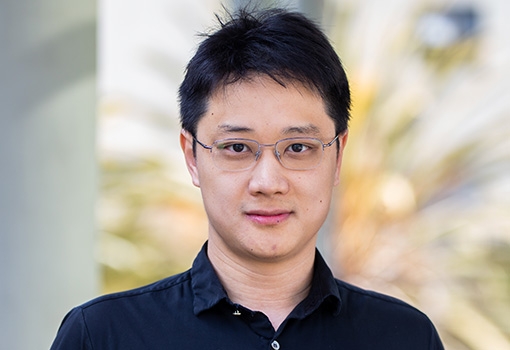Chen Shang, a postdoctoral researcher for UC Santa Barbara’s Institute for Energy Efficiency (IEE), has been awarded the 2023 Tingye Li Innovation Prize, one of the most prestigious international honors given to early-career researchers in the field of lasers and electro-optics. Shang was selected for his leading-edge work that was featured in a paper accepted by the Conference on Lasers and Electro-Optics (CLEO), the premiere conference in the field.
“Receiving the Li Innovation Prize is definitely a significant milestone on my career path as a researcher,” said Shang, who earned his PhD in materials at UCSB last year. “The honor reassures me that my work is moving in the right direction and that it is impactful. I hope it opens up future research opportunities for me as a researcher.
“Integrating silicon and III-V materials via direct epitaxy is the most economically feasible approach in the long run if the performance, reliability, and the yield of the devices are up to spec,” explains Shang, who was advised while completing his PhD at UCSB by IEE Director John Bowers, a distinguished professor in the Electrical and Computer Engineering and Materials Departments. “However, the material property dissimilarities between III-V and silicon (Si) result in numerous types of crystalline defects which hinder the widespread adoption of the said technology.”
Shang’s work is thus to tackle these crystalline defects and to develop the material platform that would potentially help realize truly monolithically integrated on-chip light sources at large scale for photonic integrated circuits (PIC). His paper, titled “Scalable on-chip lasers grown on 300 mm Si wafers,” details the most recent work, which is built on top of years of dedicated efforts by previous group members, that he and his colleagues did to demonstrate the first electrically pumped quantum dot lasers epitaxially grown in narrow pockets patterned on Si photonic wafers by molecular beam epitaxy and to point out a path for future research.
Shang and his colleagues found that material quality and device performance are strongly correlated to how the pockets are aligned to the III-V crystals. They concluded that all pockets on the integration template must be aligned to one particular orientation of the III-V crystal to ensure device yield. Fortunately, the same orientation requirement could also promote device performance and reliability.
“Since the pocket orientation design rules must be applied at the beginning of integration template construction, I believe that our findings will help members of our field make one less mistake.” says Shang.
Shang, who previously received the AIM Photonics Fellowship and the Peter J. Frenkel Foundation, presented his research with an invited talk at CLEO this year.

UCSB postdoctoral researcher Chen Shang
